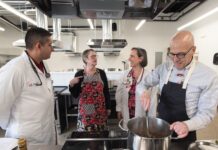
LOUISVILLE, Ky. — The University of Louisville is conducting a clinical trial on a new treatment for critically ill COVID-19 patients meant to lessen some of the most severe and deadly respiratory effects.
The treatment, a new formulation of Aviptadil (RLF-100), produced by Pennsylvania-based NeuroRx and Relief Therapeutics Holding, SA, of Geneva, works by combating “cytokine storm,” an unchecked overreaction of the body’s immune response. These storms can cause severe lung inflammation and stiffening that make it difficult, if not impossible, for patients to breathe on their own.
“We want to mitigate these storms,” said the clinical trial lead, Rainer Lenhardt, M.D., associate professor of anesthesiology and critical care in the UofL School of Medicine. “We’re doing anything we can to improve outcomes.”
COVID-19 is primarily a respiratory disease and about 80 percent of cases are mild to moderate, according to WebMD. But in severe and critical cases, the lungs can swell and fill with fluid as the body tries to fight off the infection. This severe respiratory failure is a major cause of COVID-19-related death.
“These patients are terribly ill,” said Forest W. Arnold, D.O., M.Sc., an investigator on the clinical trial and an associate professor in the UofL Division of Infectious Diseases. “And because this virus is so novel, options for treatment are just now being developed. This gives us another option.”
In this Phase 2b/3 trial, UofL and other sites will treat at least 144 patients. To be eligible, participants must be patients at UofL Hospital receiving intubation and mechanical ventilation due to COVID-19-induced severe respiratory failure. Phase 2 and Phase 3 trials determine effectiveness and monitor for adverse reactions. A list of other ongoing clinical trials at UofL is available here.
The drug has previously been used for other indications, but in this formulation, it acts as an anti-inflammatory agent. The formulation is believed to protect alveolar type-2 cells in the lungs which are essential to oxygen exchange and are thought to be a major target of the SARS-CoV-2 virus.
In Phase 1 trials, designed to assess safety and dosage, seven of eight patients with acute respiratory distress caused by sepsis were taken off breathing machines after receiving the drug and six eventually left the hospital.
“Our No. 1 goal is to provide a potentially life-saving therapy to critically ill patients with COVID-19. The FDA has granted fast-track designation for RLF-100 underscoring the urgent need for new treatment options,” said Jonathan Javitt, M.D., M.P.H., CEO and chairman of NeuroRx. “We are excited to work with UofL and leverage its clinical research and infectious disease expertise to advance research in COVID-19.”
Since the coronavirus pandemic began, UofL has taken a leadership role in investigating and developing innovative ways to prevent, diagnose and treat the virus. Researchers are working to block coronavirus from infecting human cells, launching groundbreaking initiatives for testing, building robots that can sanitize high-risk areas and more. If you are interested in supporting this or other COVID-19 research at UofL, contact Lisa Warner at lisa.warner@louisville.edu or visit give.louisville.edu.
#WeAreUofL
ATTENTION MEDIA: Additional images and video of the manufacturing process are available on request. Contact betty.coffman@louisville.edu.


























